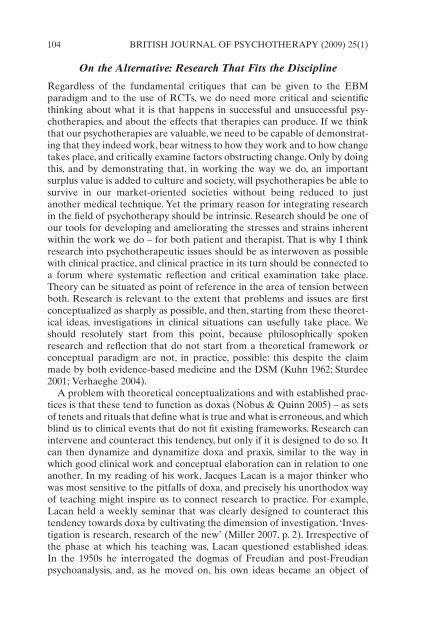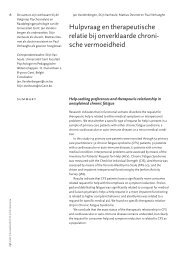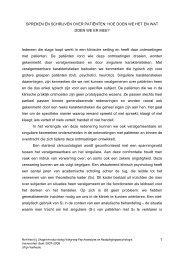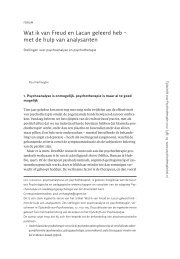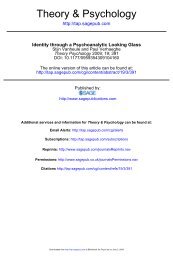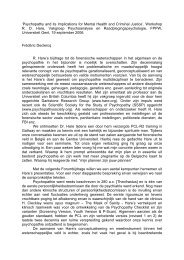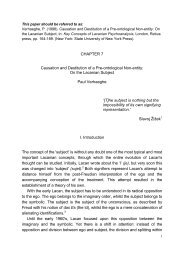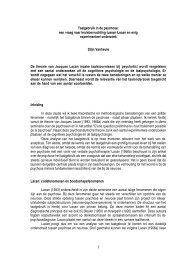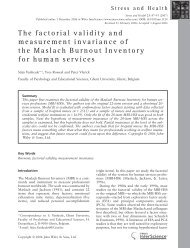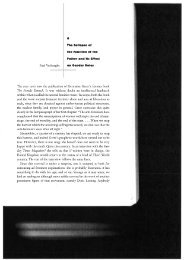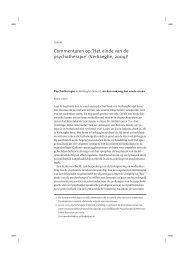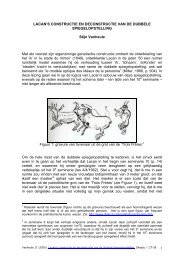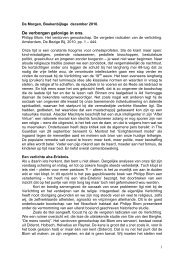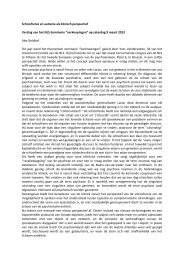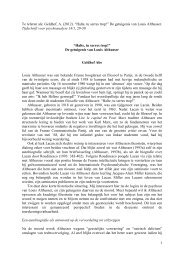psychotherapy and research
psychotherapy and research
psychotherapy and research
You also want an ePaper? Increase the reach of your titles
YUMPU automatically turns print PDFs into web optimized ePapers that Google loves.
104 BRITISH JOURNAL OF PSYCHOTHERAPY (2009) 25(1)On the Alternative: Research That Fits the DisciplineRegardless of the fundamental critiques that can be given to the EBMparadigm <strong>and</strong> to the use of RCTs, we do need more critical <strong>and</strong> scientificthinking about what it is that happens in successful <strong>and</strong> unsuccessful psychotherapies,<strong>and</strong> about the effects that therapies can produce. If we thinkthat our psychotherapies are valuable, we need to be capable of demonstratingthat they indeed work, bear witness to how they work <strong>and</strong> to how changetakes place, <strong>and</strong> critically examine factors obstructing change. Only by doingthis, <strong>and</strong> by demonstrating that, in working the way we do, an importantsurplus value is added to culture <strong>and</strong> society, will psychotherapies be able tosurvive in our market-oriented societies without being reduced to justanother medical technique. Yet the primary reason for integrating <strong>research</strong>in the field of <strong>psychotherapy</strong> should be intrinsic. Research should be one ofour tools for developing <strong>and</strong> ameliorating the stresses <strong>and</strong> strains inherentwithin the work we do – for both patient <strong>and</strong> therapist. That is why I think<strong>research</strong> into psychotherapeutic issues should be as interwoven as possiblewith clinical practice, <strong>and</strong> clinical practice in its turn should be connected toa forum where systematic reflection <strong>and</strong> critical examination take place.Theory can be situated as point of reference in the area of tension betweenboth. Research is relevant to the extent that problems <strong>and</strong> issues are firstconceptualized as sharply as possible, <strong>and</strong> then, starting from these theoreticalideas, investigations in clinical situations can usefully take place. Weshould resolutely start from this point, because philosophically spoken<strong>research</strong> <strong>and</strong> reflection that do not start from a theoretical framework orconceptual paradigm are not, in practice, possible: this despite the claimmade by both evidence-based medicine <strong>and</strong> the DSM (Kuhn 1962; Sturdee2001; Verhaeghe 2004).A problem with theoretical conceptualizations <strong>and</strong> with established practicesis that these tend to function as doxas (Nobus & Quinn 2005) – as setsof tenets <strong>and</strong> rituals that define what is true <strong>and</strong> what is erroneous, <strong>and</strong> whichblind us to clinical events that do not fit existing frameworks. Research canintervene <strong>and</strong> counteract this tendency, but only if it is designed to do so. Itcan then dynamize <strong>and</strong> dynamitize doxa <strong>and</strong> praxis, similar to the way inwhich good clinical work <strong>and</strong> conceptual elaboration can in relation to oneanother. In my reading of his work, Jacques Lacan is a major thinker whowas most sensitive to the pitfalls of doxa, <strong>and</strong> precisely his unorthodox wayof teaching might inspire us to connect <strong>research</strong> to practice. For example,Lacan held a weekly seminar that was clearly designed to counteract thistendency towards doxa by cultivating the dimension of investigation. ‘Investigationis <strong>research</strong>, <strong>research</strong> of the new’ (Miller 2007, p. 2). Irrespective ofthe phase at which his teaching was, Lacan questioned established ideas.In the 1950s he interrogated the dogmas of Freudian <strong>and</strong> post-Freudianpsychoanalysis, <strong>and</strong>, as he moved on, his own ideas became an object of


